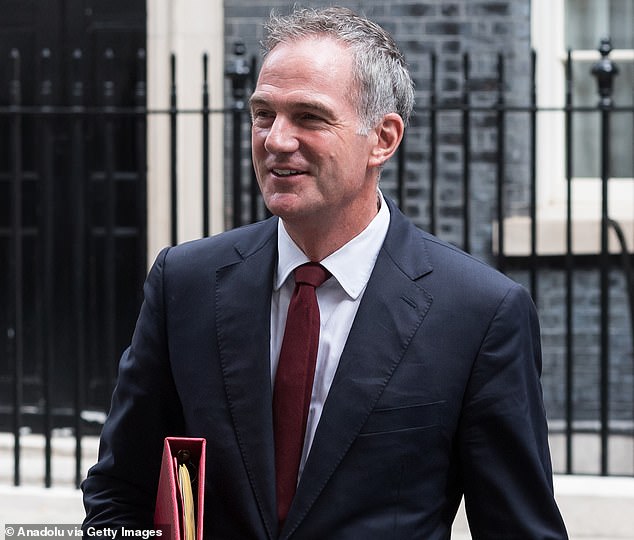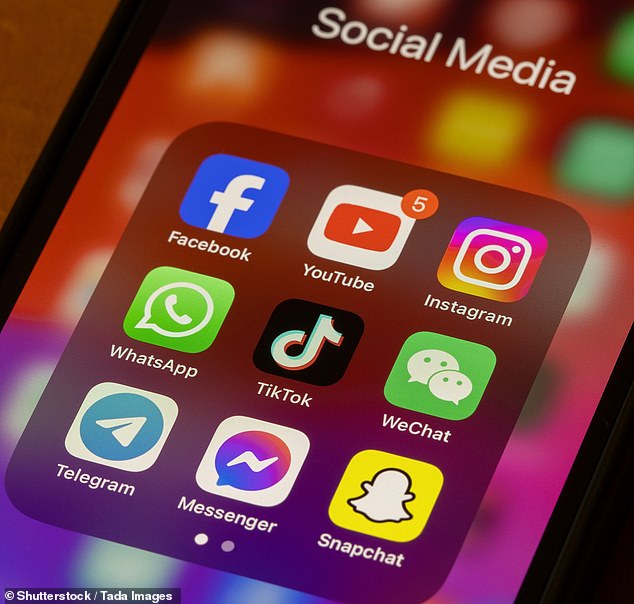Children could be limited to two hours per day on social media sites in a bid to break ‘unhealthy’ doomscrolling habits.
Peter Kyle, the Technology Secretary, said the Government was ‘looking very carefully’ at how to stop youngsters spending hours viewing online content.
The Cabinet minister warned that children were displaying ‘compulsive behaviour’ on some apps and ‘need some help just to take control of their online lives’.
According to Sky News, a two-hour cap per platform is being seriously considered following ministers’ meetings with current and former employees of tech companies.
A night-time or school-time curfew has also been discussed. The measures would block children from accessing apps such as TikTok or Snapchat once they hit a limit.
Mr Kyle told the TV news channel: ‘I’ll be making an announcement on these things in the near future.
‘But I am looking very carefully about the overall time kids spend on these apps.
‘I think some parents feel a bit disempowered about how to actually make their kids healthier online.’

Peter Kyle, the Technology Secretary, said the Government was ‘looking very carefully’ at how to stop youngsters spending hours viewing online content.

A two-hour cap per platform is being seriously considered following ministers’ meetings with current and former employees of tech companies
The Technology Secretary added: ‘I think some kids feel that sometimes there is so much compulsive behaviour with interaction with the apps.
‘They need some help just to take control of their online lives and those are things I’m looking at really carefully.
‘We talk a lot about a healthy childhood offline. We need to do the same online. I think sleep is very important, to be able to focus on studying is very important.’
Mr Kyle said his aim was to stop children spending hours viewing content which ‘isn’t criminal, but it’s unhealthy, the overuse of some of these apps’.
He added that he wanted to ‘tip the balance’ in favour of parents ‘not always being the ones who are just ripping phones out of the kids’ hands’.
‘I think we can incentivise the companies and we can set a slightly different threshold,’ he continued.
A survey of 1,000 children from Darlington, County Durham, mostly aged 14 and 15, found that 40 per cent of them spent at least six hours a day online.
One in five spent as long as eight hours scrolling.
Most of the under-16s (55 per cent) had seen inappropriate sexual or violent content – often unprompted.
And three-quarters of the under-16s had been contacted online by strangers.
One Labour MP who has been pushing the Government to better protect under-16s from addictive social media content welcomed Mr Kyle’s comments.
But they warned there was a need to ensure time-limits or curfews were being properly enforced, and they would need to be combined with robust age verification.
Others questioned how effective a two-hour cap per platform would actually be in preventing children from ‘doomscrolling’ online.
Miriam Cates, a former Tory MP and ex-teacher who is now a senior fellow at the Centre for Social Justice think tank, said it was ‘about as useful as a chocolate teapot’.
She told MailOnline: ‘I’m pleased Peter Kyle is beginning to take seriously the enormous damage being done to children by addictive social media apps.
‘But a two-hour limit per day per app is about as useful as a chocolate teapot.
‘There are dozens of social media platforms so once their time has expired, children can just switch to a new one.
‘The Government needs to stand up to Big Tech – an industry that is just as exploitative as Big Tobacco – and force them to keep children off their platforms altogether.’
Iona Silverman, IP and media partner at law firm Freeths, said: ‘Although Ofcom has made a start in regulating the highest risk platforms, it needs to move to tackle every day harms, such as excessive exposure to social media.
‘The suggestion of a two-hour limit is interesting: some might argue that two hours on social media is too long in itself.
‘The real question that springs to mind is, how will this be enforced? Given most young people are using a number of different social media platforms, possibly across a number of different devices, it will be incredibly hard to police any kind of cap.
‘In addition to legislative change and increased enforcement from regulators, we need to see a cultural shift.
‘Parents need to have more open conversations with children and young people about social media, and should also try to model the use they want their children to see.’
Under the Online Safety Act, sites containing potentially harmful content, like porn sites, will have to perform age checks on users.
Any company that fails to comply with the checks by this Friday could be fined or could be made unavailable in the UK through a court order.












